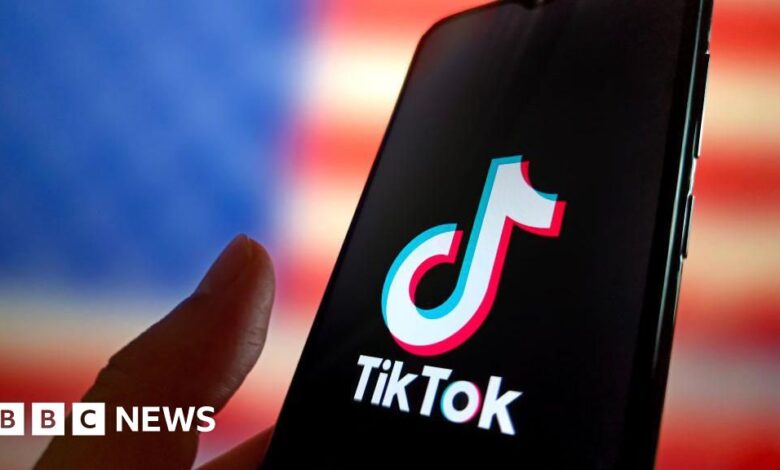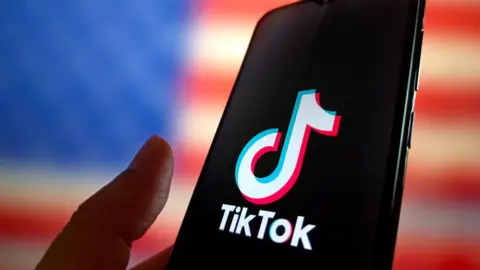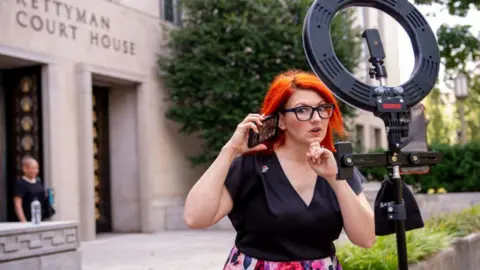TikTok says US ban would have ‘devastating’ impact on free speech

 Getty Images
Getty ImagesTikTok argued in court on Monday that a US law — under which the app would be banned unless it was sold by ByteDance — would have a “staggering” impact on the free speech rights of its US users.
The law was introduced due to concerns that US users’ data could be exploited by the Chinese government.
TikTok and ByteDance have repeatedly denied any ties to the Chinese government.
The companies sued to block the law in early May, calling it unconstitutional and an effective ban on free speech for its 170 million users in the United States.
A three-judge panel heard the company’s arguments at the appeals court in Washington DC on Monday.
“This law imposes a special prohibition on speech based on unspecified future risks,” TikTok and ByteDance lawyer Andrew Pincus told the court.
Concerns around China emerged early on, with Mr Pincus declaring that the company was “not owned” by the country.
“The owner of TikTok is ByteDance Limited, a Cayman Islands holding company,” he said.
But Judge Sri Srinivasan replied that the company was “under Chinese control”.
Mr Pincus said the US government did not allege any wrongdoing had taken place – and the company was punished for suggesting there might be problems in the future.
But he was challenged over his argument that the law would be an unprecedented ban on a single speaker — and his claim that it would be “unfeasible” to divest the company’s US arm.
Justice Ginsberg argued that the law was “an absolute bar to the company’s existing control arrangement,” not to the company itself.
He also said the target was a group of companies controlled by a foreign rival, not just TikTok.
Constitutional rights
Jeffrey Fisher, representing creators concerned about the law, said it could impede their constitutional right to work with editors and publishers of their choice — such as TikTok, which they currently own.
TikTok creator Tiffany Cianci, who is not among the creators involved in the lawsuit, livestreamed outside the hearing to update viewers on the proceedings.
She told the BBC that 65,000 people watched her TikTok live stream.
“The American people care about this,” she said. “They pay attention because they are worried about losing something.”
 Getty Images
Getty ImagesMs Cianci added that politicians’ use of the platform ahead of the 2024 presidential election seemed “contrived” and made her question the security concerns in the controversial law.
“If it was dangerous, they wouldn’t have gone there,” she said.
Justice Department attorney Daniel Tenny disputed TikTok’s argument that the source code behind the platform is based in the United States.
“There is really no dispute here that the recommendation engine was maintained, developed, and written by ByteDance and not TikTok US,” he said.
“That’s not an American expression in America – it’s a Chinese engineer expression in China.”
Mr Fisher claimed posts on the platform in the US were American speech and “at most edited by a foreign company”.
In addition to data concerns, officials and lawmakers have expressed concern about the prospect of TikTok being used by the Chinese government to propaganda for Americans.
However, advocates of America’s strong freedom of speech, enshrined in the First Amendment of the U.S. Constitution, argue that maintaining divestment or ban laws would be a gift to authoritarian regimes everywhere.
Xiangnong Wang, a lawyer at Columbia University’s Knight First Amendment Institute, said repressive regimes around the world could use it to “justify new restrictions on their citizens’ access to information, ideas, and media from abroad.”
‘High stakes’
But the law is designed to withstand judicial scrutiny, according to James Lewis of the Center for Strategic and International Studies in Washington.
“The nature of the lawsuit against TikTok is very serious,” Mr. Lewis said.
“The bottom line is whether the court accepts that the divestment requirement does not regulate speech.”
Mr. Lewis added that the court typically defers to the president’s decisions on national security issues.
Regardless of how the appeals court rules, most experts agree the case could drag on for months, perhaps even longer.
Gautam Hans, professor of clinical law at Cornell Law School, told the BBC he believed the appeal was likely to go either way.
The government’s ability to legislate and regulate national security is “critical,” he said.
“They cannot be restricted by the courts from doing that.”
But he added that the issues were also “life-threatening” for TikTok, as the company said it could not divest and therefore had no choice but to shut down.
Mike Proulx, vice president and research director at analyst firm Forrester, added that the “highly contentious” case is likely to make its way to the highest court in the United States, the Supreme Court.
Additional reporting by Liv McMahon





